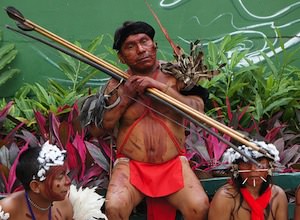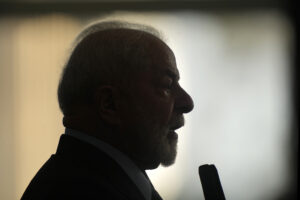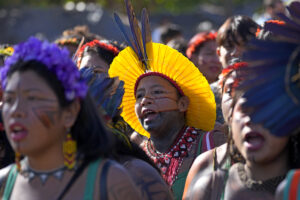Celebrated Scientist Renounces National Academy and War
Last month, University of Chicago anthropologist Marshall Sahlins resigned from the National Academy of Sciences to protest the election to the group of Napoleon Chagnon, a peer whose specious arguments in favor of a natural human tendency toward violence have helped militarize the discipline and legitimize wars of aggression.
Last month, University of Chicago anthropologist Marshall Sahlins resigned from the National Academy of Sciences to protest the election to the group of Napoleon Chagnon, a peer whose specious arguments in favor of a natural human tendency toward violence have helped militarize the discipline and legitimize wars of aggression.
Saint Martin’s University anthropology professor David Price writes in CounterPunch that Chagnon descended into infamy in the eyes of many of his colleagues when he published a best-selling and widely influential ethnography that described the Yanomami of Brazil (whom he observed during fieldwork in the 1960s and ’70s) as “the fierce people.” He did this, he says, because of the high levels of violence he witnessed within the group and against neighboring tribes. Chagnon put his observations forward as evidence that humans are innately violent, in what he claimed (erroneously, as many anthropologists contend) to be their natural state.
Chagnon’s conclusions have been criticized as being the result of bad scientific practice. Anthropologist Jon Marks, on his blog Anthropomics, recently described Chagnon as an “incompetent anthropologist.” He clarified as follows:
Let me be clear about my use of the word “incompetent”. His methods for collecting, analyzing and interpreting his data are outside the range of acceptable anthropological practices. Yes, he saw the Yanomamo doing nasty things. But when he concluded from his observations that the Yanomamo are innately and primordially “fierce” he lost his anthropological credibility, because he had not demonstrated any such thing. He has a right to his views, as creationists and racists have a right to theirs, but the evidence does not support the conclusion, which makes it scientifically incompetent.
Throughout his career, Sahlins has worked to demonstrate that culture can motivate people in ways that have nothing to do with biology. This puts him at direct odds with Chagnon, whose controversial and broadly contested view is that biology is the prime driver of social behavior. Sahlins’ response to the academy’s granting one of its few limited seats to Chagnon echoes Marks’:
By the evidence of his own writings as well as the testimony of others, including Amazonian peoples and professional scholars of the region, Chagnon has done serious harm to the indigenous communities among whom he did research. At the same time, his “scientific” claims about human evolution and the genetic selection for male violence–as in the notorious study he published in 1988 in Science–have proven to be shallow and baseless, much to the discredit of the anthropological discipline. At best, his election to the NAS was a large moral and intellectual blunder on the part of members of the Academy. So much so that my own participation in the Academy has become an embarrassment.
Another reason for his resignation, he added, was a moral objection to the academy’s increasing role in research that facilitates the United States’ general posture of war:
Nor do I wish to be a party to the aid, comfort, and support the NAS is giving to social science research on improving the combat performance of the US military, given the toll that military has taken on the blood, treasure, and happiness of American people, and the suffering it has imposed on other peoples in the unnecessary wars of this century. I believe that the NAS, if it involves itself at all in related research, should be studying how to promote peace, not how to make war.”
Scientists worldwide have risen to support Sahlins’ principled stance. Professor Eduardo Viveiros de Castro of the National Museum in Rio de Janeiro told Sahlins and others in an email that Chagnon is “an enemy of Amazonian Indians,” and thanked “Prof. Sahlins for his courageous and firm position in support of the Yanomami and of anthropological science.”
The controversy raises an issue that has plagued the scientific community since its clear emergence in the Enlightenment: How can people of conscience keep science from becoming a pawn for power?
— Posted by Alexander Reed Kelly.
Your support matters…David H. Price at CounterPunch:
We are left to wonder what is to become of science, whether practiced with a capital (at times blind) “S” or a lower case inquisitive variety, when those questioning some its practices, misapplications and outcomes are increasingly marginalized, while those whose findings align with our broader cultural values of warfare are embraced. The NAS’s rallying around such a divisive figure as Chagnon, demonizing his critics, claiming they are attacking not his practices and theories, but science itself damages the credibility of these scientists. It is unfortunate that the National Academy of Sciences has backed itself into this corner.
The dynamics of such divisiveness are not unique to this small segment of the scientific community. In his 1966 essay on, “The Destruction of Conscience in Vietnam,” Sahlins argued that to continue wage the war, America had to destroy its own conscience—that facing those destroyed by our actions was too much for the nation to otherwise bare, writing: “Conscience must be destroyed: it has to end at the barrel of a gun, it cannot extend to the bullet. So all peripheral rationales fade into the background. It becomes a war of transcendent purpose, and in such a war all efforts on the side of Good are virtuous, and all deaths unfortunate necessary. The end justifies the means.”
Independent journalism is under threat and overshadowed by heavily funded mainstream media.
You can help level the playing field. Become a member.
Your tax-deductible contribution keeps us digging beneath the headlines to give you thought-provoking, investigative reporting and analysis that unearths what's really happening- without compromise.
Give today to support our courageous, independent journalists.






You need to be a supporter to comment.
There are currently no responses to this article.
Be the first to respond.